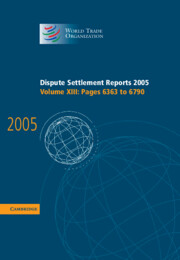European Communities - Export Subsidies on Sugar (WT/DS265, WT/DS266, WT/DS283): Report of the Appellate Body
Published online by Cambridge University Press: 13 December 2017
Summary
INTRODUCTION
The European Communities appeals certain issues of law and legal interpretations contained in the Panel Reports, European Communities - Export Subsidies on Sugar (the “Panel Reports”). The Panel was established to consider complaints by Australia, Brazil, and Thailand (the “Complaining Parties”) regarding export subsidies for sugar and sugar-containing products accorded under Council Regulation (EC) No. 1260/2001 of 19 June 2001 (“EC Regulation 1260/2001”) and related instruments (together, the “EC sugar regime”).
EC Regulation 1260/2001 is valid for the marketing years 2001/2002 to 2005/2006 and establishes, inter alia: quotas for sugar production; an intervention price for raw and white sugar, respectively; a basic price and a minimum price for beet for quota sugar production; quota (that is, “A” and “B”) sugar as well as non-quota (that is, “C”) sugar ; import and export licensing requirements; producer levies; and preferential import arrangements. Furthermore, the EC sugar regime provides “export refunds” to its sugar exporters for certain quantities of sugar, other than C sugar. These “refunds”, which are direct export subsidies, cover the difference between the European Communities’ internal market price and the prevailing world market price for sugar. Non-quota sugar (that is, C sugar) must be exported, unless it is carried forward, but no “export refunds” are provided for such exports. The factual aspects of the EC sugar regime are set out in greater detail in the Panel Reports.
The Complaining Parties claimed before the Panel that, under the EC sugar regime, the European Communities provided export subsidies for sugar in excess of its reduction commitment levels specified in Section II, Part IV of the European Communities’ Schedule, in violation of certain provisions of the Agreement on Agriculture and the Agreement on Subsidies and Countervailing Measures (the “SCM Agreement”) governing export subsidies. The Complaining Parties alleged that such subsidies in excess of the European Communities' reduction commitment levels were provided to exports of C sugar as well as to sugar equivalent in volume to sugar imported into the European Communities under preferential arrangements with certain African–Caribbean–Pacific countries (the “ACP Countries”) and India.
- Type
- Chapter
- Information
- Dispute Settlement Reports 2005 , pp. 6365 - 6498Publisher: Cambridge University PressPrint publication year: 2007
- 7
- Cited by



